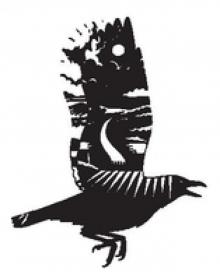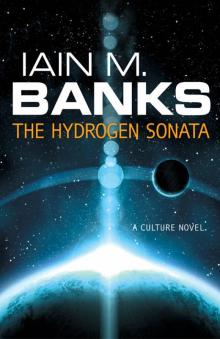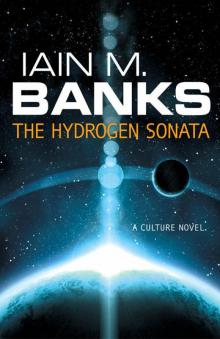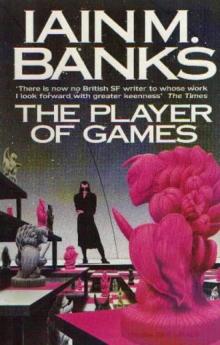- Home
- Iain M. Banks
The Hydrogen Sonata c-10 Page 2
The Hydrogen Sonata c-10 Read online
Page 2
The elevenstring was an acoustic instrument — usually bowed though occasionally plucked — of considerable antiquity and even more notable size. Standing over two metres tall, one metre across and more than one and a half deep, it required its player both to straddle it and to sit within it; poised on the small saddle forming part of the base of the hollow around which the rest of the instrument bulked like a giant deformed ring, the player used both legs to create two-thirds of a supporting tripod for the instrument, the final third being formed by a single spar protruding from its base like an inelegantly substantial walking stick.
The first examples had been made of wood, though later versions had been constructed of plastic, metal, grown shell and artificial bone; the one Vyr Cossont owned and was playing was mostly carbon fibre, which had long been the most common and traditional material.
Cossont reached the end of one particularly taxing section of the piece and took a rest. She stretched her back, flexed her aching feet inside her slippers — the elevenstring required that its player use two small pedals to tamp certain strings, while their heels balanced the weight of both player and instrument — and placed the instrument’s two bows across the front of the little saddle she sat on.
Cossont scanned the skies above the terrace, where some streaky pink and orange clouds stood out against the darkening blue of evening. Two kilometres beneath, the Kwaalon plains were already night black, not a light showing between the last canted cliff of the Girdlecity and the far, flat horizon. A cooling wind moved across the terrace, moaning through banister wires, whistling as it curled round Cossont’s flier — parked twenty metres away on its own tripod of skinny legs — and making the girl herself shiver once in her thin trews and jacket.
She shifted some wind-loosened hair out of her eyes and kept gazing up and around. A kilometres-distant smudge might be a flock of birds; her familiar, Pyan, was probably flying with them, playing. Her eyes strained, magnifying the view as best they could; she could feel rings of tiny muscles warping the lenses in each eye, while other filaments altered the shape of her foveae. Were those birds — and of the right species? But the distance was too great. There might be a larger dark shape mixed in with the flock, but there might not. Even if there was, it might just be a larger bird being mobbed.
There was probably some local system she could ask to find out and quite possibly one or more of the flock would be augmented or entirely artificial, allowing her, in theory, to interrogate them regarding her familiar’s whereabouts, but she had grown used, lately, to such systems either not working at all or not working properly — like pretty much all systems everywhere, throughout the Gzilt civilisation, from what she could gather. And anyway, she found it hard to be sufficiently bothered. She also knew better than to try talking to the creature at such moments unless there was some genuinely dire emergency; Pyan, in the end, was its own being, not her property. Sometimes she wondered if it was even her friend.
She sighed, stretched her arms out and loosely shook all four hands, as though trying to free them from something sticky.
She arched her back again; it had become stiff during the last quarter of an hour or so as she’d tackled the demanding middle section of the work. She stood carefully, holding on to the neck of the elevenstring with one hand, lifting the two bows with another, running a third hand through her hair and picking her nose with her fourth.
The elevenstring ideally required its player to have four hands. It could be played by two people, though this required some serious coordination and sometimes fancy footwork, and almost all the pieces written for it, including the Hydrogen Sonata, could be performed adequately by a string trio plus a couple of suitably tuned basses, but to be played as it was intended to be, Vilabier The Younger’s most famous composition really required the bodily acoustic Antagonistic Undecagonstring for four hands, and a single, dextrous instrumentalist.
The instrument, like the work, was near impossible to play acceptably, let alone perfectly, yet one demanded the other and the great Antagonistic Undecagonstringists (only a handful in the near millieon since the piece was written) had, allegedly, played and — even more annoyingly, as far as Cossont was concerned — left recordings of the complete work, to show it could be done.
Cossont was acknowledged as a gifted instrumentalist with a particular feeling for ancient string instruments — she had been one of the top five Volupt players in all Gzilt, and was now the single greatest, though admittedly only because the other four were all Stored, awaiting the Sublime — but she was beginning to despair of accomplishing her self-assumed life-task before her whole civilisation simply ceased to be in the Real and she and everyone she knew and loved took, rejoicing, to the metaphorical skies of the Sublime. Playing the Hydrogen Sonata once, note perfect, straight through, without a break save for the few seconds between individual movements; that was Vyr’s chosen life-task. It only sounded easy if you knew nothing of either the Sonata or the elevenstring. As far as she was concerned, the Subliming couldn’t come fast enough.
Twenty-three days to the big moment now. Twenty-three days to do all the other things she might want to do before the Ultimate Enfold or whatever people were calling it these days and still get this appallingly long, complicated and player-unfriendly piece nailed to her own satisfaction, never mind anybody else’s.
She doubted she’d make it. She had even started thinking of giving up entirely, beginning to agree with those who held that life-tasks weren’t really about accomplishing anything beyond the passing of time before all such tasks, ambitions, goals and aspirations became — supposedly — laughably irrelevant and petty.
“Flier,” she said, inspecting the end of one finger, flicking it to remove what was on the tip, then rubbing her back with the same hand, “is Pyan with those birds?” She pointed.
The two-seat flier, a chunky little aircraft with stubby wings, made a show of waking up, turning lights on in the hinged-open cockpit. “Yes,” it told her, through her earbud. “Do you want me to summon it?”
“Not yet,” she said, sighing again. “Can you send up that — you know — your… that little—”
“My minidrone.”
“That’s the fella. Keep an eye on it. In case it’s not listening when we…” Her voice trailed off as she swayed from side to side, stretching. She shook a couple of her hands again, tucked the instrument bows under one arm and started trying to push the loosened strands of her hair back into its band. “Weather?” she asked, as a small hatch opened along the flier’s dorsal bulge and a tiny version of the machine buzzed into the air, turning and zipping off towards where she’d seen the distant flock of birds. The minidrone was visible for just a few seconds, illuminated mostly by the hazy light reflecting from the Girdlecity’s upper reaches, the nearest few hundred horizontal kilometres of which still shone in the sunlight like some vast tracery of silver and gold wrapped across the sky.
“Cooling at a degree every fifty minutes,” the flier told her. “Wind variable but increasing to an average of 18 km/h, gusting twenty-five, backing west-north-west.”
Cossont frowned, gazing north-west across the plains to some far, shadow-dark mountains, then looked back at the sloped cliff of Girdlecity behind her. The vast structure was a steep-sided upheaval of semi-exotic metal tubes and facings, curved and sweeping walls of synthetic stone dresswork, swirled patterns of diamond-film windows and whole stretched filigrees of carbon-black cabling, the entire confusion of pierced architectures rising almost straight up to its bright, curved, horizon-to-horizon summit, nearly two hundred kilometres above and arguably, if not technically, in space. She did something she had only taken to doing recently when she was on or in the Girdlecity; she just stood looking, waiting to see some movement. There wasn’t any. There rarely was, these days. Sometimes she felt like the only person still alive and un-Stored in the whole world.
Looking between the various local components of the Girdlecity, Cossont could see sky and clouds on
the far side of the colossal artefact, perhaps fifty kilometres away; the sky was brighter to the south, the clouds wispier. The degree of Through here — the proportion of architecture to open air — was about fifty per cent, meaning that winds had an unusually good chance of blowing straight through.
“That might work,” she muttered.
Cossont rubbed at her back again. The Gzilt conventionally possessed the humanoid-normal complement of arms — two, according to most authorities — and the alterations required to provide Vyr with twice the average while retaining the desired qualities of litheness and flexibility had meant leaving her with a spine that was prone to seizing up if left stressed too long in the one position.
“Mind if I sleep?” the flier asked.
“No; you sleep,” Cossont said, flapping one hand at the aircraft as she inspected the elevenstring’s tuning keys and machine heads. “Wait till I need you. Going comms down myself,” she said, clicking at the earbud that controlled the relevant implants.
The flier switched off its lights, hinged the cockpit closed and went quiet and dark.
Alone again, in a pocket of silence as the wind dropped and all went still, Cossont paused for a moment. She looked up into the blue-black sky with its tinily pointed spray of stars and sat-light, and wondered what it would really be like to be Sublimed, to have gone through with it, to be living on this reputedly fabulously and unarguably real Other Side.
The Gzilt had been living with the idea of Subliming for centuries, generations. At first only a few people had thought it would be a good idea; then, gradually, over time, more and more had. Eventually you had the sort of numbers that would make the whole thing work, because to do it properly required serious numbers — preferably a whole civilisation.
In theory an individual could Sublime, but in practice only solitary AIs ever did, successfully. It took something as complex and self-referentially perfect as a high-level AI to have the cohesion to stand up to the Sublime alone; no normal biological individual could — you just evaporated in there. It was not utter annihilation — all the information you brought with you remained — but the persona, the individual as a functioning, identifiable and distinctive entity — that was gone. Civilisations, and the individuals within those civilisations, survived and flourished in the Sublime over galactically significant periods of time, though they gradually changed beyond comprehension.
That, though, would have happened anyway, had those societies stayed in the Real, and all the research and comparisons and experts and statistics agreed that there was orders-of-magnitude more stability in the Sublime than in the realm of mere matter and energy.
Cossont sighed. She had no idea why she was staring up at the sky to think about all this. The Sublime, like some ideas of God or whatever, was all around. She inspected the end of one of her upper-arm fingers. The tip was callused with wear from trying to control the strings of the elevenstring. The Sublime might as well be in the ridges of hardened skin on the end of her finger as up in the sky.
Parcelled, rolled, compressed and enfolded into the dimensions beyond the dimensions beyond the ones you could see and understand; that was where the Sublime was, and it was a maze-like series of right-angle turns away from this, from normal, three-dimensional reality where she stood on a high platform at sunset, thinking about it.
Cossont had a hard enough time really comprehending hyperspace, the fourth dimension, let alone the next three or four that somehow encompassed the Reality and allowed for nested universes to climb away from the universe-creating singularity at the centre of things and either circle back round some immense cosmic doughnut to be re-compacted and born again, or radiate away into whatever it was that surrounded this mind-boggling ultra-universe.
And the Sublimed lay in dimensions beyond even that; unutterably microscopic, unassailably far away but at the same time everywhere, shot through the fabric of space-time not so much like the individual fibres of this metaphorical weave, or their tiniest filaments or their molecules or their atoms or their sub-atomic particles but — pointedly — like the infinitesimal strings that made up those, that made up everything. In dimensions seven to eleven; that was where the Sublimed lay.
And that, of course, was why the elevenstring had eleven strings; it had first been designed all of ten thousand years ago, but even then people had had an inkling about how all this far-reaches-of-reality stuff worked, and artists had thought to incorporate something of these revelations into their own fields, including musical composition. Why the extra internal, resonating strings were there as well — up to thirteen of them, in addition to the ones that could be accessed from the outside of the instrument — she still wasn’t entirely sure. They were a bastard to tune but it was somehow only appropriate to the awkward, obstructive character of the elevenstring that, despite its name, it actually had more than eleven strings.
The wind picked up, soughing across the platform. A few hairs blew across her face. She tucked them back firmly.
Eighteen kinds of weather. Of all the things she’d heard about the Sublime, throughout all the attempts people had made to explain what it was like in any meaningful way, that was the one detail she could remember. It had eighteen different types of weather, not one. She wasn’t even sure what this really meant, let alone whether it was genuinely an improvement on reality.
She took a few deep breaths, readying herself to sit within the instrument and start playing, but still wasn’t quite ready. She kept thinking back to an encounter earlier that evening, shortly after the flier had brought her here from her home, a couple of thousand kilometres away in a part of the Girdlecity still partially inhabited, to this part, overlooking the plains of Kwaalon, where, as far as she knew, there was nobody living at all, not for tens of klicks in any direction.
She preferred solitude when she played the elevenstring.
Even before she’d opened the cockpit canopy, Pyan had noticed some birds in the distance and asked permission to go and play with them.
She’d sighed, said yes; the creature had unfastened itself from round her neck and flapped off. She’d hoisted the elevenstring’s case from the rear seats of the flier, gone to open it, then, on a whim, changed her mind, told the flier to watch over the case — and immediately felt stupid; who did she think she was protecting it from? — and had gone for a stroll in the Girdlecity.
It was dark inside, and chilly. In most places, a few lights would come on automatically, sensing her movement or the heat of her body; in other stretches she had to rely on her eyes alone, nano-enhancement ramping up what little light there was into a grainy ghost-scape. The air grew colder; her jacket and trews slowly puffed up, keeping her warm. She walked along broad corridors and walkways overhanging deep, echoing, unlit spaces, past arcades and giant pipes, girder work and bowled auditoria, listening to her footsteps echo amongst the gloom.
The great world-circling Girdlecity.
Many Gzilt looked upon it as something they could be proud to leave behind when they Sublimed — a monument to their genius, vision and power — conveniently forgetting that they hadn’t actually built it. They’d spent thousands of years building on and within the vast structure and had added significantly to it, but the original structure, and the concept of it, had not been theirs at all.
The Girdlecity had been built by the Werpesh, an ancient humanoid species themselves long-Sublimed. The Gzilt had fallen heir to it, the planet it braceleted and the system itself — along with several other stellar systems — eleven thousand years ago, but despite their long association with, protection of and work on the Girdlecity, the original credit lay elsewhere.
Still, they had cared for it all that time, made it their own in some sense, and, if nothing else, had laid down a marker for its guardianship in the future.
Near the centre of what had been a residential area, long abandoned, she came upon an old school with its cargo of the Stored. A stacked landscape of barely glowing white boxes, registering as a litt
le above ambient temperature, were arranged within what had been the playground. More gently glowing heat was visible radiating from inside the building itself, and the ceiling of the great vault above glowed even more faintly with reflected or convected warmth. Dead trees stood, skeletal.
A guard arbite near the locked school gates unfolded itself from its resting ball shape and drew itself up to its full three-metre height, an exaggerated human shape all glittering angles and obvious weapon pods. It looked intimidating, like it was supposed to. Even from a few metres away, it gave the impression of towering over her. Vyr was suddenly aware of how very un-military her jacket was; it had an image emblazoned on it of a dung-chomp/smutter band she’d played electric volupt for, years ago. The Lords of Excrement — complete with their colourful if wince-inducing logo — had seemed a dubious, going-on-childish name even twenty years ago, yet the jacket had remained a favourite because it reminded her of a good time in her life. It was one of the few she’d had altered to accommodate her new set of arms.
“Citizen,” the arbite said, then must have identified her from some processing she had with her — probably her earbud. “Reserve Lieutenant Commander,” it corrected itself, and saluted.
“Just taking a stroll, arbite,” she told the machine.
It remained motionless, seemed to think about this, then without another word folded itself back into its resting sphere-shape with a sort of metallically oiled grace. Compacted, it looked like a piece of sculpture.
She wandered on, and encountered the family by the side of another great drop, where a broad roadway hung over one of the hundred-metre-wide open-work tunnels that threaded their way through the Girdlecity. The man and the woman were huddled round a little fire, its light reflecting off the wall of diamond-film wall lining the roadway.
“Good evening,” she said to them, looking quizzically at the fire, which was just a small stack of burning logs. More cut lengths of tree were heaped just beyond where they sat. Both looked up at her, unsmiling. They were dressed for outdoors and looked slightly unkempt. Cossont couldn’t see anything to identify them. Her implants were unable to sense anything electronic on them either, which was most unusual. Their faces were smudged. She wanted to march them both off to the nearest working shower and get them cleaned up.

 Use of Weapons
Use of Weapons Transition
Transition The Crow Road
The Crow Road Feersum Endjinn
Feersum Endjinn Matter
Matter Surface Detail
Surface Detail The Wasp Factory
The Wasp Factory Consider Phlebas
Consider Phlebas Against a Dark Background
Against a Dark Background Excession
Excession The Hydrogen Sonata
The Hydrogen Sonata The Algebraist
The Algebraist The Player of Games
The Player of Games The State of the Art
The State of the Art The Hydrogen Sonata c-10
The Hydrogen Sonata c-10 Excession c-5
Excession c-5 The Player of Games c-2
The Player of Games c-2 Matter c-8
Matter c-8 The State of The Art c-4
The State of The Art c-4 Look to Windward c-7
Look to Windward c-7 Consider Phlebas c-1
Consider Phlebas c-1